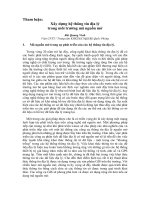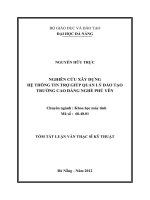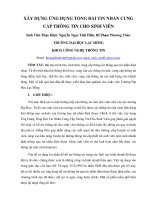xây dựng ứng dụng hệ thống thông tin chapter04 37
Bạn đang xem bản rút gọn của tài liệu. Xem và tải ngay bản đầy đủ của tài liệu tại đây (610.64 KB, 37 trang )
4
Chapter 4:
Beginning the Analysis:
Investigating System Requirements
Systems Analysis and Design in a Changing
World, 3rd Edition
4
Learning Objectives
Describe the activities of the systems analysis life
cycle phase
Explain the effect of business process
reengineering on activities of the analysis phase
Describe the difference between functional and
nonfunctional system requirements
Identify and understand the different types of
users who will be involved in investigating system
requirements
2
4
Learning Objectives (continued)
Describe the kind of information that is required to
develop system requirements
Determine system requirements through review
of documentation, interviews, observation,
prototypes, questionnaires, vendor research, and
joint application design sessions
Discuss the need for validation of system
requirements to ensure accuracy and
completeness and the use of a structured
walkthrough
3
4
Overview
Analysis phase of SDLC skills needed:
Fact-finding for investigation of system
requirements
Analyst should learn details of business processes
and daily operations
Analyst should become as knowledgeable as
business domain users to build credibility
Analyst brings fresh perspective to problem
Modeling of business processes based on system
requirements
4
4
The Analysis Phase in More Detail
Gather information
Define system requirements
Logical model and physical model
Prioritize requirements
Prototype for feasibility and discovery
Generate and evaluate alternatives
Review recommendations with management
5
4
The Activities of the Analysis Phase
6
Activities of the Analysis Phase
and Their Key Questions
7
4
Business Process Reengineering
and Analysis
Fundamental strategic approach to organizing
company
Streamlines internal processes to be as efficient
and effective as possible
Questions basic assumptions for doing business
and seeks to find a better way
Uses IT as BPR enabler
Systems analyst may discover opportunities for
process improvement
Any project may include components of BPR
8
4
4
System Requirements
New system capabilities and constraints
Functional requirements are:
Activities system must perform
Based on procedures and business functions
Documented in analysis models
Nonfunctional requirements include:
Operating environment or performance objectives
Usability, reliability, and security requirements
9
4
Stakeholders – The Source of
System Requirements
People with interest in successful system
implementation
Three primary groups of stakeholders:
Users (use system)
Clients (pay for and own system)
Technical staff (ensure system operation)
Every type of stakeholder is identified by analyst
10
4
Stakeholders Interested
in New System Development
11
4
Users as Stakeholders
Horizontal user roles - information flow across
departments
Vertical user roles - information needs of clerical
staff, middle management, and senior executives
Business users perform day-to-day operations
Information users need current information
Management users need summary information
Executive users need strategic information
External users may have access to system
12
4
Techniques for Information Gathering
Analysis phase done to understand business
functions and develop system requirements
Original structured approach
Create model of existing system
Derive requirements from existing system model
Current approach
Identify logical requirements for new system
Balance the review of current business functions
with new system requirements
13
4
Information Gathering and Model Building
14
Themes for Information-Gathering
Questions
15
4
4
Fact Finding Methods
Review existing reports, forms, and procedure
descriptions
Interview and discussion processes with users
Observe and document business processes
Build prototypes
Distribute and collect questionnaires
Conduct joint application design (JAD) sessions
Research vendor solutions
16
Review Existing Reports, Forms,
and Procedure Descriptions
Source: External industry wide professional
organizations and trade publications
Source: Existing business documents and
procedure descriptions within organization
Identify business rules, discrepancies, and
redundancies
Be cautious of outdated material
Obtain preliminary understanding of processes
Use as guidelines / visual cues to guide interviews
17
4
4
Sample Order Form for RMO
18
4
Conduct Interviews and Discussions with Users
Effective way to understand business functions
and rules
Time-consuming and resource-expensive
May require multiple sessions to:
Meet all users
Understand all processing requirements
Can meet with individuals or groups of users
List of detailed questions prepared
19
4
Sample Checklist to Prepare for User Interviews
20
4
A Sample Open-items List
21
4
Observe and Document Business Processes
Varies from office walkthrough to performing
actual tasks
Not necessary to observe all processes at same
level of detail
May make users nervous, so use common sense
May be documented with workflow (activity)
diagrams
22
4
Activity Diagram Symbols
23
4
Simple Activity Diagram
to Demonstrate a Workflow
24
4
Activity Diagram Showing Concurrent Paths
25









